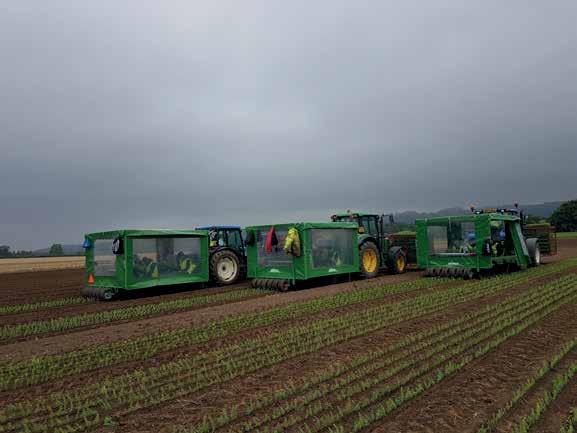
3 minute read
YEAR OF PLANT HEALTH
Plant health: the nursery perspective
Charles Beaumont, Trees Please, on behalf of the Confor Nursery Producers Group
As we travel through the year of 2020, the impact of Covid-19 on human health may make it hard to focus also on the huge importance of plant health. Great Britain sits proudly as an island nation and should have an advantage when it comes to protecting itself from pests and diseases (P&D) that visit us from abroad but, in practice, membership of a ‘common’ market and ever more open borders have made it hard for us to profit from this.
Of course, British nurseries have not always behaved sensibly or carefully towards preventing infection. In 2012, forest nurseries were largely negligent in the importation and rapid spread of Ash dieback which served to highlight the nadir of a long decline in woodland planting (and consequent nursery capacity) that had started with a well meaning but ill judged tax change in 1988.
By 2012, Dutch climate advantages meant that it was much cheaper for nurseries to import one-year-old Ash than to spend two years growing it at home. This much regretted low point, however, also served as the catalyst for a much needed, and spectacularly successful, clean up for us all. Within two months of the realisation of the horrors that had been released, Confor’s Nursery Production Group of eleven major tree nurseries had agreed to include “Country where grown” on its documentation; this has changed the sector from one which used to import up to one third of its output to one that now imports only three or four percent. Sadly, this is only relevant for “whip” sized trees – instant trees are still largely imported and carry a huge risk of P&D importation as clearly demonstrated by the widespread outbreaks of Oak Processionary Moth during the summer of 2019.
What steps are nurseries taking? All NPG nurseries will, by now, have biosecurity policies in place which serve to highlight the points at which plants may become at risk from P&Ds. Simple boot washing facilities will be found on all nurseries and most nurseries will work closely with their agronomists and plant health advisers/inspectors. Our plants have to pass three inspections by external expert inspectors every year and, at Trees Please we are lucky in that our local Defra inspector lives only two miles away and can drop in on his way home if we find something that makes us nervous. We inspect all of our 40 million plant growing stock at least once a week during the growing season involving the production manager and the spray operators each time – between us we have over 100 years of experience! There is always something more that one can do and this year we have started testing our irrigation water for signs of Phytophthera and other potential problems – so far, nothing to report.
UK Plant Health Assurance Scheme On 20 February, the UK Plant Health Assurance Scheme (UKPHAS) was launched with great fanfare by Prince Charles at Kew. Whilst this has had a gestation period that would test the patience of an African elephant, it is now suckling hard on its founders’ financial reserves and a small platoon of Grown in Britain inspectors is heading out to pluck some low hanging fruit from the trees. It is likely that the members of Confor’s NPG will form part of their early diet. UKPHAS, which is now known as “Plant Healthy”, is based around a Plant Health Management Standard (PHMS) that encompasses a chain of custody. The PHMS is based on a risk-based approach, which requires a business or organisation to conduct risk assessments on the critical control points within their operations. This reduces the risk of introducing pests to their site(s) to a level that ensures an Appropriate Level of Protection (ALOP).
One of these risks, of course, is the trade of plants from one nursery to another irrespective of whether those plants are crossing a border. In this instance, a risk analysis will have to be carried out with reference to the UK Plant Health Risk Register which now carries details of over one thousand pests. The downside is that we will all have to produce much more documentation but the upside is that our businesses, and all the native flora of the UK, should be very much safer. From the customers perspective, it should be possible within a couple of years to shun businesses that are NOT Plant Healthy accredited. Power to the People! www.treesplease.co.uk

The planting fleet (picture Trees Please)





